Every month, we pick a few topics for exploration. The topics we select aren’t meant to cover every issue area facing the progressive community, but rather to give actionable advice on how to talk about key issue areas. We’ll be sharing our findings throughout the month, and in this volume we focus on:
How are Americans feeling about the health care system, and what do progressive proponents of expanded Medicare need to consider?
Two years after Republicans tried and failed to repeal the Affordable Care Act, health care is still a key issue for Americans. Democrats are more trusted than Republicans to solve our health care woes, and the public strongly supports protecting and expanding Medicare. But progressives must deal with questions about what proposals like Medicare for All really mean and explain how they will keep health care costs down.
Nearly two years after Republicans tried to repeal the Affordable Care Act, health care remains Americans’ number one issue (42% top priority for federal government*), above jobs and economic growth (32%), immigration (30%), and a variety of other items.
Given its continued national importance, Navigator examined Americans’ top priorities for our health care system. The public wants lawmakers to reduce health care costs and protect coverage for people with pre-existing conditions – and they trust Democrats more than Republicans to do it.
Costs drive concerns.
Americans’ biggest priorities for our health care system center around lowering costs – including out-of-pocket costs, premiums and deductibles, and prescription drug costs – and guaranteeing affordable coverage for people with pre-existing conditions.
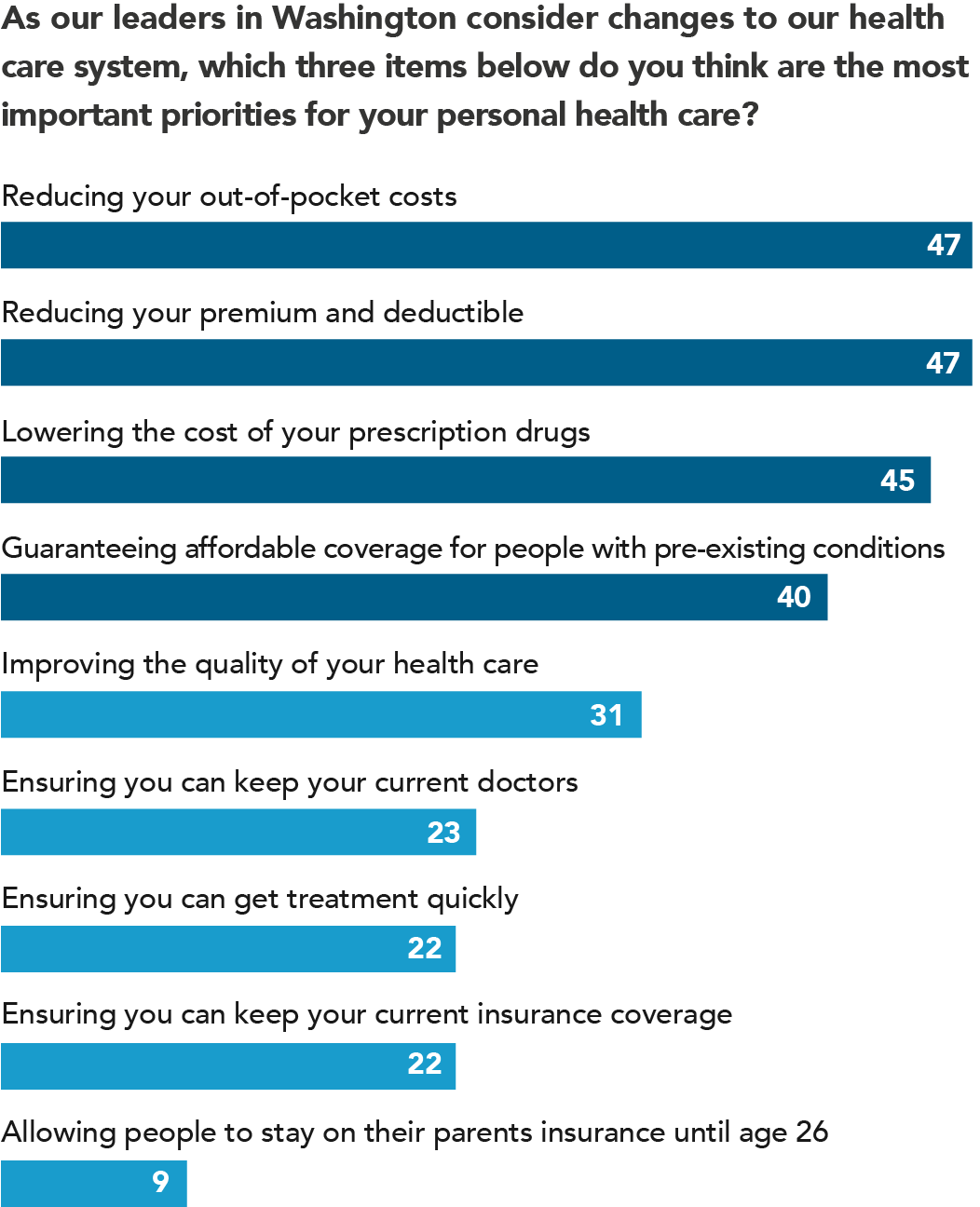
Democrats are more trusted than Republicans on health care generally, and on specific health care issues.
Since Navigator began tracking the question in April 2018,
Democrats in Congress have had an advantage on health care over Republicans in Congress, ranging from 6% to 16% (12% this month), and over President Trump, ranging from 12% to 20% (17% this month).
When it comes to Americans’ specific health care priorities, Democrats are again more trusted than Republicans. Democrats in Congress have a 24-point advantage over Republicans in Congress on protecting health care coverage for people with pre-existing conditions (53% to 29%), an 18-point advantage on making health care more affordable (51% to 33%), and a 12-point advantage on improving the quality of health care (47% to 35%).
While Democrats are more trusted than Republicans to shape the future of the nation’s health care, they do not escape blame for failing to fix the status quo. In a forced-choice exercise involving the two major parties, Americans place the blame for growing health care costs equally between Democrats and Republicans, 38% to 38%.
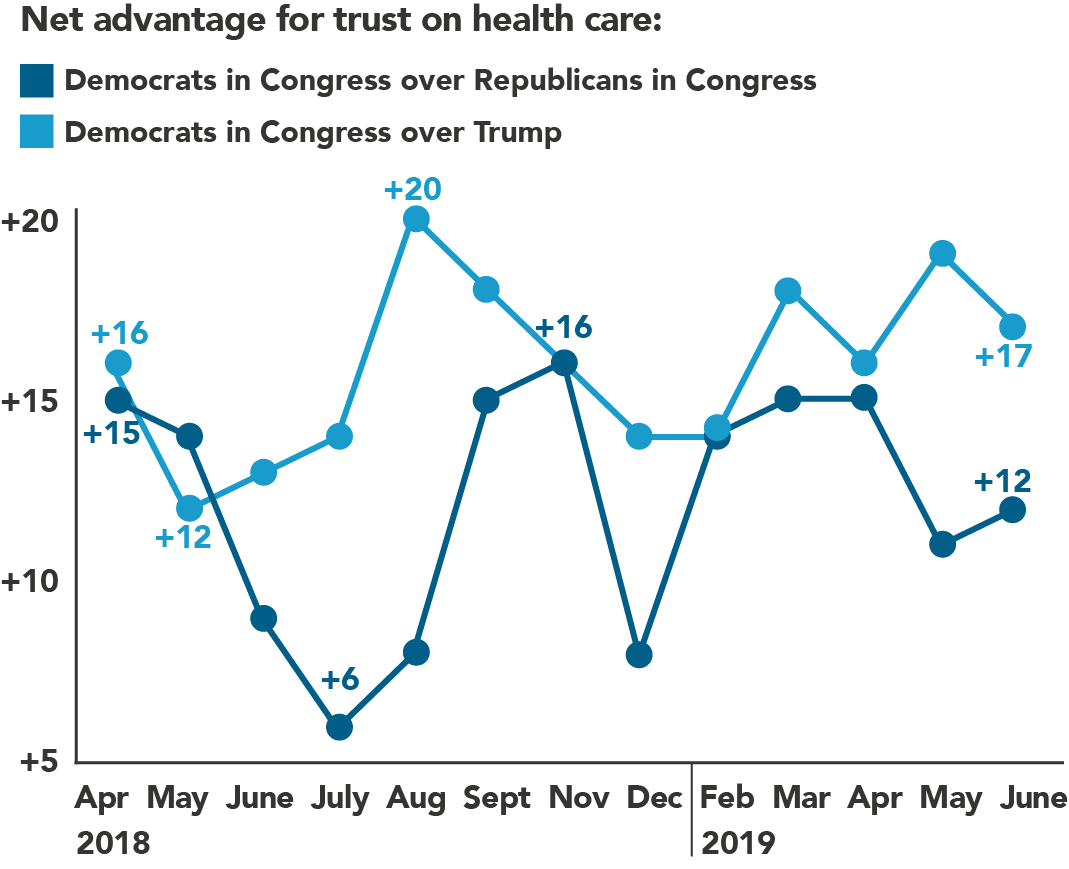
What’s in a name? With Medicare at the center of some progressive plans to expand health care, Navigator wanted to understand what “Medicare for All” really means to Americans. While there is confusion and information gaps exist about specific programs, one thing is clear: progressives should always start from a point of leveraging the popular Medicare brand regardless of whether they support protecting Medicare, expanding Medicare, adding a public option to Medicare, or a universal Medicare system that replaces private insurance. Medicare is an extremely popular brand, with 75% of Americans favorable, including 85% of Democrats, 68% of Independents, and 67% of Republicans. Further, in April, Navigator found that Democrats have a 27-point trust advantage over Republicans when it comes to protecting Medicare (53% trust Democrats in Congress, versus 26% who trust Republicans in Congress).
The simple ideas of protecting and expanding Medicare are more popular than any branded program.
The most popular Medicare ideas among the public are also
the simplest – the ideas of “protecting Medicare” and “expanding Medicare.” Both ideas are popular and have low negative ratings. “Medicare for All” as a brand shows promise, as it’s more popular than not (51% say it’s a good idea versus just 33% saying it’s a bad idea), though, as noted below, there is also clear confusion about the program. Proposals using more prescriptive language (e.g., “buy-in” or “single-payer”) score less positively, mostly due to a lack of knowledge as indicated by higher “don’t know” ratings.
Confusion: Medicare for… All who want it?
Only one in five Americans are very confident they know what “Medicare for All” would mean for our health care system (18% very confident) or their personal health care (20% very confident). When asked to characterize what “Medicare for All” means to them, respondents are divided: 40% think “Medicare for All” would eliminate the private insurance market and require everyone to switch to Medicare, while 60% think it would let anyone buy Medicare who wants to, while allowing others to stay on their private insurance. Perhaps most fascinating: Democrats are most likely to think “Medicare for All” is a “buy-in” program, while Republicans are much more likely to believe it will eliminate private insurance.
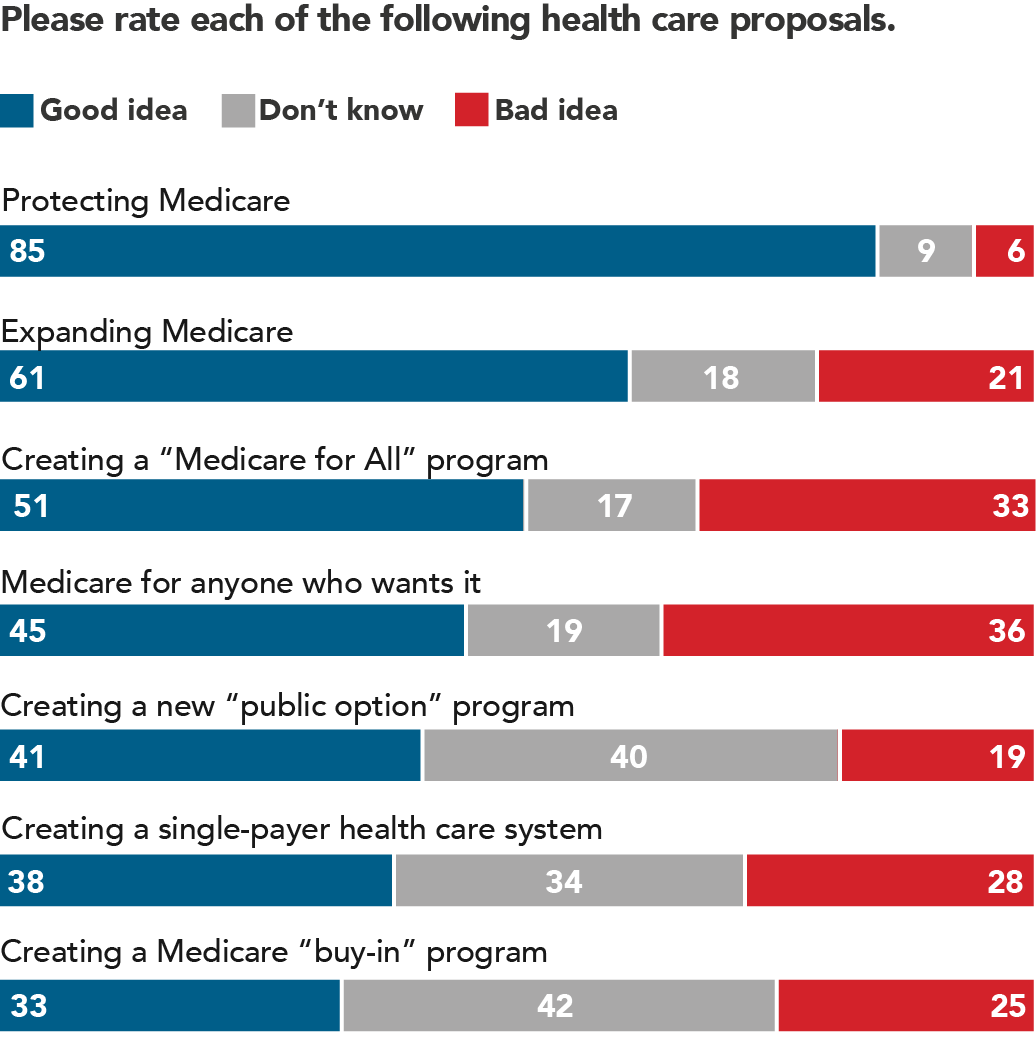
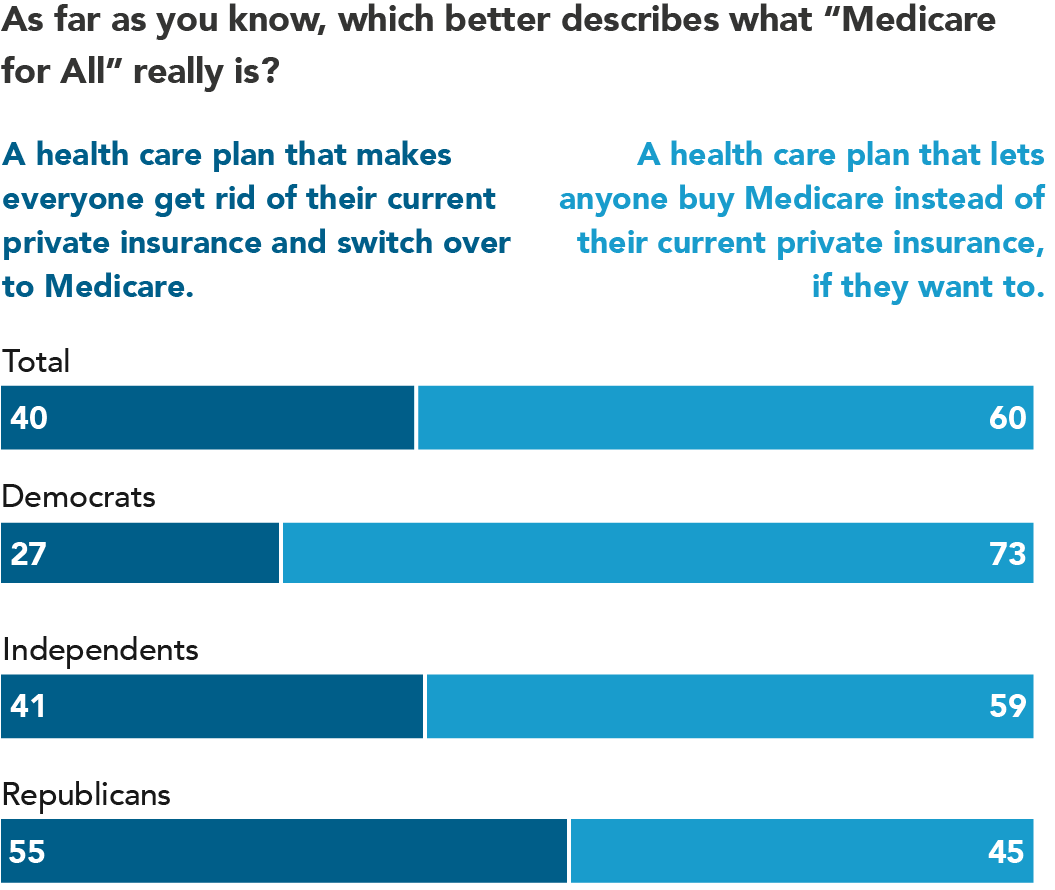
And those different interpretations of “Medicare for All” have dramatic consequences on the program’s support.
When respondents are asked whether they support “Medicare for All” – described as a buy-in program – 73% support it. However, when respondents are asked whether they would support “Medicare for All” – described as eliminating private health insurance – support drops significantly, with 47% saying they support it. This illustrates how support for Medicare for All is driven more by branding with the term “Medicare” than by specific knowledge of the program.
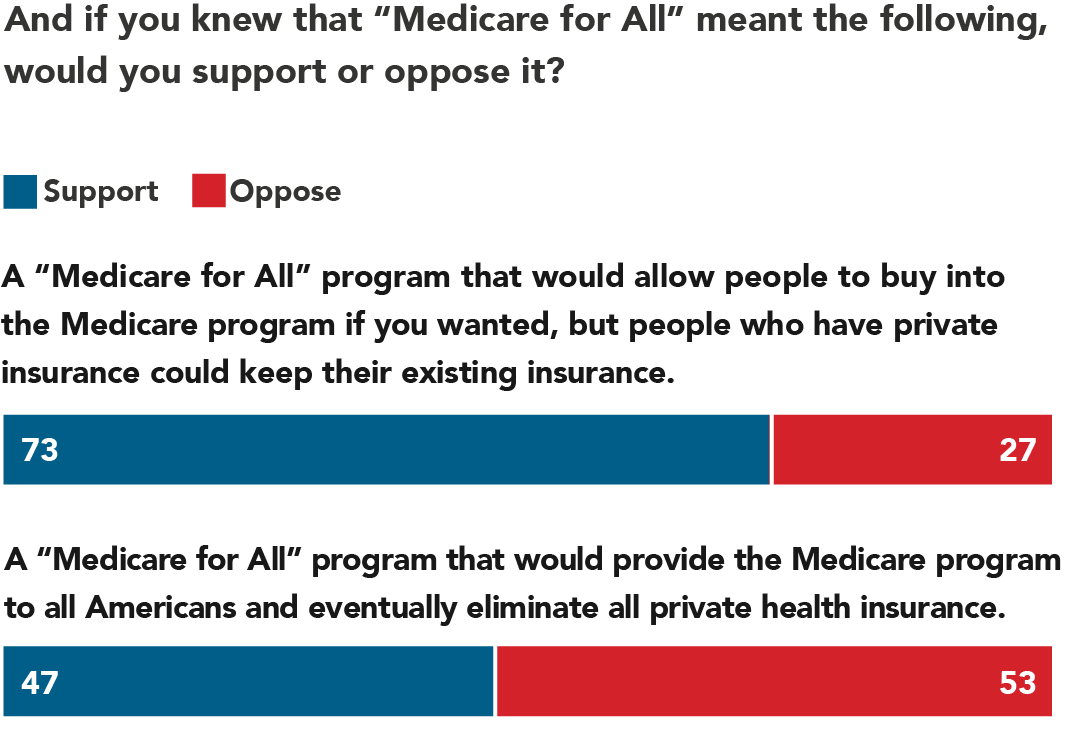
Progressives Cannot Let the Health Care Debate Get Lost in the FoxHole
Previous research by Navigator found that Republicans who watch Fox News were more than twice as likely as other Americans to have heard about the Green New Deal. The finding provides a reminder of how aggressively the conservative media echo chamber fixates on certain new progressive ideas – aiming to frame the conversation and harden opposition with their core audience before progressive groups have the opportunity to communicate their position and make a case.
More than being a well-understood and concrete policy proposal, “Medicare for All” is a popular brand at risk of suffering a similar fate. Republicans who watch Fox News are more likely to think Medicare for All will have a “very negative impact” on the quality of their personal health care than liberal Democrats are to think it will have a “very positive impact” (41% of Fox News-watching Republicans, versus 27% of liberal Democrats). And nearly two-thirds of Republicans who watch Fox News (64%) believe Medicare for All is a program that eliminates private insurance, compared to just 40% overall, showing how perceptions of Medicare for All are already forming with this group.
Americans want guaranteed coverage.
Americans think the biggest benefit of “Medicare for All” is the coverage guarantee – both in general and for people with pre-existing conditions.
Concerns about Medicare for All center on costs.
Americans are most concerned that “Medicare for All” will raise taxes, cost too much, and increase the deficit. Given Americans’ top health care concern is cost, progressives should take serious note of and grapple with these cost concerns.
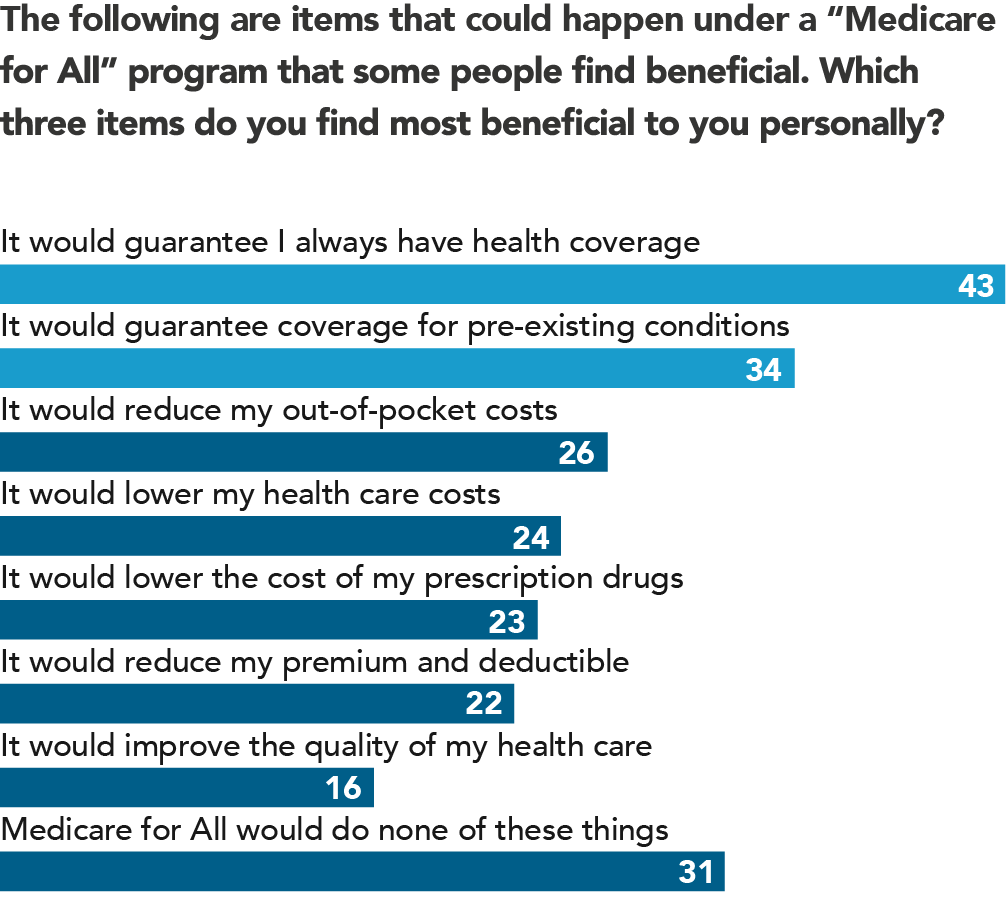
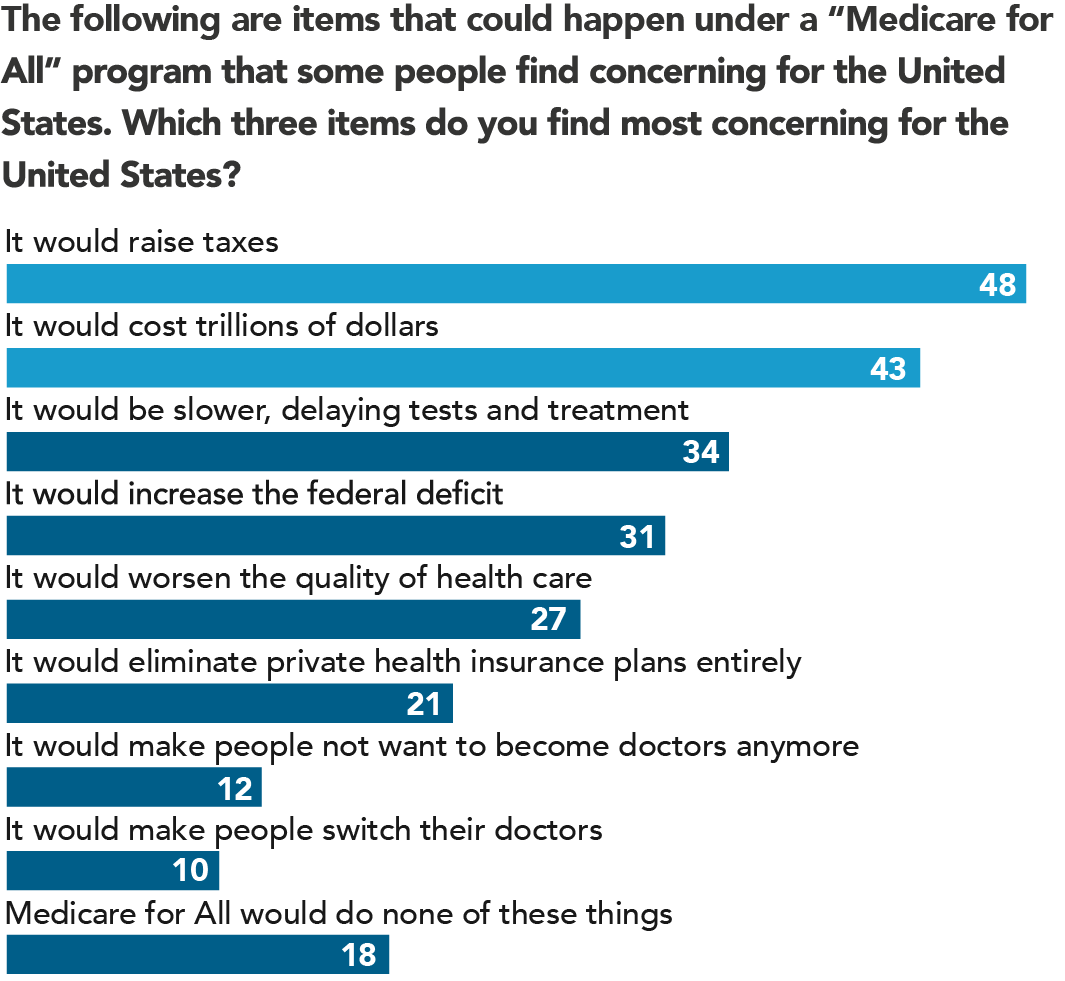
Progressives must address cost concerns in any health care proposals they push forward.
Navigator asked Americans to identify in an open-ended question their biggest concerns about “Medicare for All.” Their responses once again reinforce other warnings about costs. While the word “nothing” pops in Democrats’ responses, “cost”, “expensive”, “pay”, “taxes”, and “money” are also visible. Among Republicans, the same cost-related words pop. These findings should remind progressives to thoroughly address not just coverage but pervasive worries about costs.

